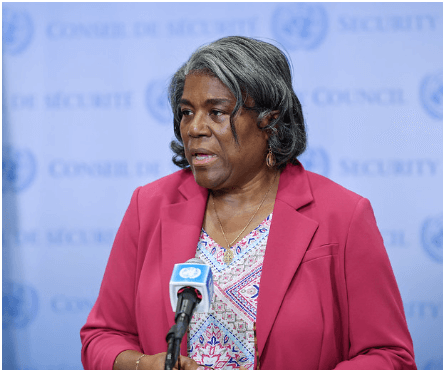
Ambassador Linda Thomas-Greenfield Highlights Empowerment and Inclusion at Women, Peace, and Security Event..
Ambassador to the United Nations, Linda Thomas-Greenfield ,At the recent Women, Peace, and Security (WPS) event, U.S. , emphasized the importance of empowering women and fostering inclusion as essential components for achieving global peace and stability.
The ambassador underscored that advancing women’s participation in peace processes and decision-making structures is not only a moral obligation but also a strategic necessity for sustainable development and conflict resolution.
Thomas-Greenfield highlighted that societies are more resilient, peaceful, and prosperous when women play an active role in shaping policies and leading initiatives. Drawing on examples from conflict zones, she pointed out that the absence of women in peace negotiations often results in agreements that overlook critical social and humanitarian issues, which can hinder long-term stability. “We cannot build lasting peace if half of the population is left behind,” she said, stressing the need for women’s voices in resolving today’s most pressing challenges.
During the event, the ambassador reaffirmed the U.S. government’s commitment to the principles of the WPS agenda, which focuses on promoting women’s inclusion in peacekeeping, conflict resolution, and humanitarian efforts worldwide. Thomas-Greenfield also announced new initiatives aimed at providing resources and opportunities for women leaders, particularly in conflict-affected regions. These programs will focus on developing leadership skills, fostering economic empowerment, and increasing access to education for women and girls.
The ambassador further emphasized that empowering women is not just about representation but about meaningful participation. “It’s not enough to have women at the table. We need their ideas, their solutions, and their leadership to guide our way forward,” she said. To that end, she called for increased efforts to remove structural barriers that limit women’s involvement in political and peace processes. This includes addressing issues such as gender-based violence, discrimination, and limited access to education and healthcare, which continue to marginalize women in many parts of the world.
Thomas-Greenfield also highlighted the success stories of women leaders who have made significant contributions to peacebuilding efforts, despite facing adversity. She cited examples from Africa, the Middle East, and Asia, where women-led grassroots movements have played crucial roles in mediating conflicts, supporting displaced communities, and advocating for social reforms. These examples, she said, demonstrate the transformative power of women’s leadership in achieving positive change.
During her address, the ambassador called for stronger global partnerships to advance the WPS agenda, urging governments, international organizations, and civil society to work together to create more inclusive frameworks. “We all have a role to play in ensuring that women everywhere have the opportunity to contribute to peace and security,” she remarked. She also stressed the importance of accountability, urging nations to follow through on their commitments to gender equality and inclusion.
The ambassador’s remarks come at a time when women’s rights are under threat in several conflict zones, with women and girls facing heightened risks of violence, exclusion, and exploitation. Thomas-Greenfield expressed concern about the setbacks in Afghanistan, where women have been stripped of their basic rights and excluded from public life, and called on the international community to take decisive action. “We must stand with Afghan women and all women fighting for their rights. Their struggle is our struggle,” she declared.
Beyond conflict zones, the ambassador addressed the impact of climate change and migration on women, noting that women are often disproportionately affected by environmental disasters and forced displacement. She urged the integration of gender-sensitive approaches in addressing these challenges, emphasizing that women must be part of the decision-making processes to develop effective solutions. “Women bring unique perspectives and skills that are essential for addressing complex issues, from conflict resolution to climate adaptation,” she said.
Thomas-Greenfield also acknowledged the challenges faced by women peacekeepers and urged the international community to support their efforts. She called for increased recruitment and training of women in peacekeeping missions, highlighting that their presence improves the effectiveness of operations and fosters trust within local communities. “When women peacekeepers are deployed, they not only provide security but also serve as role models for women and girls in conflict areas,” she noted.
As the event concluded, the ambassador urged continued momentum toward achieving the goals of the WPS agenda. She encouraged participants to act with urgency, reminding them that empowering women is not just a policy goal but a necessary step toward building a more peaceful and equitable world. “The road ahead is long, but together, we can create a future where every woman has the opportunity to lead, contribute, and thrive,” she said.
Thomas-Greenfield’s address resonated with attendees, inspiring a renewed commitment to advancing the cause of women, peace, and security. Her message reinforced the idea that peace is only possible when it is inclusive and that the full participation of women is indispensable to achieving lasting solutions to the world’s most pressing challenges. The event concluded with a call to action, urging all stakeholders to champion the empowerment of women and ensure their voices are heard in shaping the future of global peace and security.
For the latest updates-click here.


